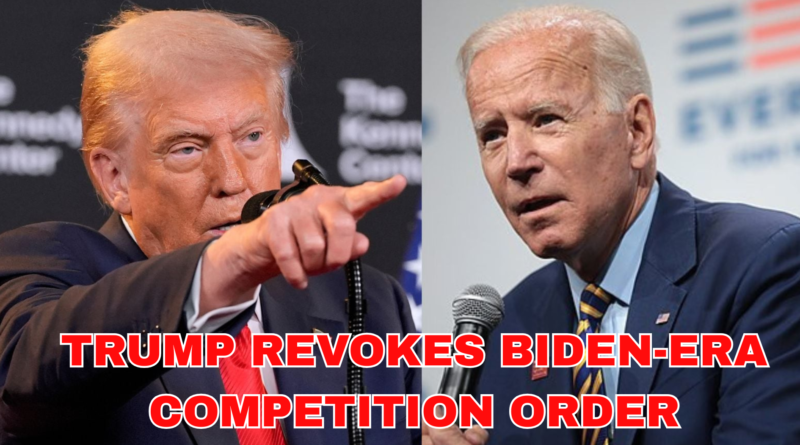TRUMP REVOKES BIDEN-ERA COMPETITION ORDER
Former U.S. President Donald Trump has officially revoked a 2021 executive order signed by President Joe Biden that sought to limit anti-competitive practices across multiple sectors of the U.S. economy. The repeal, announced during a press briefing in Washington, marks a significant shift in federal regulatory priorities and signals a rollback of one of Biden’s hallmark economic policy measures.
Background of the 2021 Order
Biden’s order, introduced in July 2021, was a sweeping directive aimed at promoting competition and curbing monopolistic behavior in industries such as agriculture, pharmaceuticals, technology, and labor markets. It called for over 70 specific actions by various federal agencies, including:
Encouraging the Federal Trade Commission (FTC) to challenge anti-competitive mergers more aggressively.
Lowering prescription drug prices by boosting the availability of generic and biosimilar medicines.
Supporting farmers and small agricultural producers against the market dominance of large meatpacking companies.
Addressing restrictive non-compete agreements that limited worker mobility and wage growth.
At the time, the Biden administration framed the order as a tool to strengthen consumer choice, reduce costs, and create fairer labor conditions. It drew praise from progressive lawmakers, labor unions, and consumer advocacy groups.
Trump’s Justification for the Repeal
In his statement, Trump criticized the Biden-era initiative as “government overreach that stifled business innovation and job creation.” He argued that the executive order created “unnecessary red tape” for American companies and discouraged investment by imposing what he described as “burdensome and politically motivated regulations.”
“America thrives when our businesses are free to compete without being shackled by bureaucratic mandates,” Trump said. He emphasized a return to a more “pro-growth” approach, prioritizing deregulation and corporate flexibility over aggressive federal intervention.
Trump also suggested that certain provisions in Biden’s order particularly those targeting consolidation in the tech and agricultural sectors were influenced by “ideological bias” rather than objective market analysis.
Industry and Political Reactions
The repeal has triggered mixed reactions across the political spectrum and within the business community:
Business groups such as the U.S. Chamber of Commerce and the National Association of Manufacturers welcomed the move, saying it will reduce compliance costs and free up resources for expansion and hiring.
Consumer rights advocates expressed concern that the repeal could lead to greater corporate concentration, less market choice, and higher prices for everyday goods.
Agricultural unions and small farm associations warned that without Biden’s protections, smaller producers could again face unfair pricing practices from large agribusiness firms.
Progressive lawmakers sharply criticized the decision, calling it a gift to “corporate monopolies at the expense of working families.”
Economic and Policy Implications
With the Biden order now nullified, federal agencies will have fewer directives compelling them to scrutinize mergers, investigate price-fixing, or challenge non-compete clauses. While antitrust enforcement is still guided by longstanding U.S. laws such as the Sherman Act and the Clayton Act, the absence of Biden’s executive push means agencies may act less aggressively in these areas.
Economists are divided on the potential consequences. Some predict short-term boosts in corporate investment and market activity due to relaxed oversight, while others warn that unchecked consolidation could harm small businesses, workers, and consumers over the long term.
Looking Ahead
Trump’s action highlights the ongoing tug-of-war in U.S. economic policy between regulatory expansion and deregulation. The revocation is expected to spark renewed debates in Congress over antitrust laws, labor protections, and consumer rights. Legal experts also note that state-level regulators may step in to fill enforcement gaps left by the federal rollback.
In the coming months, major industries including Big Tech, pharmaceuticals, and agriculture are likely to test the boundaries of this new regulatory environment. Meanwhile, advocacy groups are preparing campaigns to pressure lawmakers into reinstating certain protections through legislative means rather than executive action.
Whether this policy shift leads to broader economic growth or entrenches corporate dominance remains to be seen. What is clear is that the decision marks a sharp reversal in America’s approach to market competition, reflecting the contrasting economic visions of Biden and Trump and setting the stage for a larger national debate on the balance between free enterprise and fair markets.




